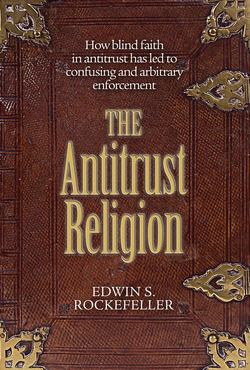Читать книгу The Antitrust Religion - Edwin S. Rockefeller - Страница 11
На сайте Литреса книга снята с продажи.
2. The Antitrust Community
ОглавлениеThe antitrust faith is preserved by a cult of professional followers who call themselves “the antitrust community.” Basic elements of the antitrust faith have been part of the American psyche since the “trust-busting” era of Theodore Roosevelt, but it was not until the 1950s that a cadre of professionals devoted to promotion of antitrust took shape. President Eisenhower’s attorney general, Herbert Brownell, appointed a National Committee to Study the Antitrust Laws. In 1955 that group published a report that became a handbook for aspiring antitrust lawyers. The group’s members and consultants formed a nucleus of the antitrust community-to-be.
In 1953 the incoming Eisenhower administration replaced Herbert Bergson as assistant attorney general in charge of the antitrust division. Bergson then opened an office for the private practice of law in Washington, and promptly took on representation of corporate clients, including those seeking merger clearances from the antitrust division. Having just left that office, his qualifications for such representation were unmatched. But Brownell indicted Bergson under a law that prohibits representing someone with a claim against the government within two years of leaving government employment. A district judge dismissed the indictment, concluding that a claim means a demand for money or property, not the seeking of merger clearances.1 The indictment may have gilded rather than tarnished Bergson’s attractiveness to corporate clients with antitrust problems. Within five years he had built a premier practice and was elected chairman of the American Bar Association’s antitrust law section, which he had helped organize in 1952.
Although the antitrust community is a welcoming group and its members enjoy a feeling of kinship, one cannot become a member of it overnight. It takes about six months to become familiar with the territory and comfortable with the language. The veteran has little advantage over the novice, since neither can predict results, but the practitioner has to speak the language. The subject is not complex, merely confusing to outsiders. As has been said about coaching football, one must be smart enough to be good at it and dumb enough to take it seriously. There are three steps in the process of joining the antitrust community. The required skills can be acquired in law school or by reading or listening to continuing legal education lectures. First, one must become familiar with a few statutory provisions and be able to recall them at any time. Second, one must learn to recognize a few terms not found in the statutes, such as “per se” and “rule of reason” and a few case names, like Illinois Brick and Noerr-Pennington so as not to be one-upped by other initiates, who like to use case names as shorthand for the doctrines they contain. Third, one must pick up a few terms from microeconomic theory.
The third step is a critical one—learning to speak a vocabulary of meaningless or ambiguous terms with authority. one must learn to use metaphors like “market” and “barrier to entry” as though they have meaning that one fully understands. That skill comes through practice with actual situations where decisions are being made—in government or private law practice—learning through experience at the expense of the taxpayer or of the private client. Simple use of the terms is not enough. Statements must be made with sufficient pomp that it is difficult for the listener to avoid taking them seriously. And to be taken seriously one has to take oneself seriously. That skill is acquired not by listening but by talking when others are forced to listen. In that respect, there is no substitute for government service since the government antitrust official must be listened to no matter what is being said. In the antitrust community, just the right amount of self-righteousness must be displayed. Here, also, government experience is the best teacher.
There is an additional dimension to the value of government experience, particularly if it is recent. Today there are obstacles to making immediate use of government experience for the benefit of a private client the way Bergson did in the early 1950s, but if lawyers are to attract and hold clients with antitrust problems, it helps if clients think the lawyer has some better source of information than the newspapers. Appearance of proximity to the decisionmaker adds value to the lawyer’s opinions. Much antitrust law practice consists of assessing and influencing the thinking of middle-level government officials on matters over which they have broad discretion. The antitrust lawyer is selling access to and insight into the minds of those making subjective decisions off the record. In merger matters, that is almost the entire game. Statutory and case law, if applied vigorously, would stop virtually all corporate mergers, leaving only this question: will the government attack this one? Pinning the right descriptive metaphor on a set of facts determines the outcome.
No amount of study of written material can provide as much chance to avoid expensive miscalculations as a well-timed lunch, tennis game, or casual resort hotel conversation with a well-chosen official. It is not a matter of corruption but of access to decisionmak-ers and assessment of their thinking. As professor Spencer Waller, director of the Institute for Consumer Antitrust Studies at Loyola Chicago School of Law, has written, “Knowledge of the decision-makers, familiarity with current enforcement policy, even if unpublished, and access to the agencies play a critical role in selling oneself as an expert.”2
